In today’s Substack-fueled shout-out, Code for Charlottesville is seeking volunteers with tech, data, design, and research skills to work on community service projects. Founded in September 2019, Code for Charlottesville has worked on projects with the Legal Aid Justice Center, the Charlottesville Fire Department, and the Charlottesville Office of Human Rights. Visit the Code for Charlottesville website to learn more, including details on three projects that are underway.
In today’s show:
Charlottesville City Council talks pools, next steps on a controversial West Main statue, and agree to no property tax rate this year while acknowledging one for next year is possible
Albemarle Architectural Review Board takes a look at the Fontaine Avenue and the Ivy Road corridor
At any given City Council meeting, a lot happens. This is a set of highlights from March 15, 2021. Let’s start with an update on one lingering issue.
In February, the city sent out a request for information for entities who might be interested in taking over ownership of the Lewis, Clark and Sacajawea statue. Here’s City Manager Chip Boyles.
“And we do have nine informational responses that we received,” Boyles said. “Staff will take these informational responses, do a review, and come back to Council with a recommendation with how to move forward with the removal of that statue.”
The statue is within the boundary of the first phase of the West Main Streetscape project. Council voted to remove the statue in November 2019 and directed staff last October to pursue that outcome separately from the transportation project. (previous story)
Ridge Street traffic projects
One item on the consent agenda were the recommendations of a task force for how a small pool of federal funding should be spent in the Ridge Street Neighborhood. The group is suggesting that $25,000 in Community Development Block Grant (CDBG) money be spent on traffic calming and another $220,000 be spent on three sidewalk projects. As part of the traffic calming, speed limit signs would be installed on the old section of Ridge Street.
Council gave their approval as part of the consent agenda vote. Before the vote, Charlottesville Mayor Nikuyah Walker asked a question.
“How was it determined that there was excessive speeding?” she asked.
City traffic engineer Brennen Duncan responded.
“There have been a few traffic studies, speed studies, that were done on that section over the last five to ten years and all of them showed that there is a speeding issue on old Ridge Street,” Duncan said.
The Reopening of City Pools
Last week, the Charlottesville Parks and Recreation Advisory Board sent a letter requesting a plan to safely reopen facilities and pools. City Manager Chip Boyles gave an update.
“Parks and Recreation has a schedule and a plan for beginning to open up facilities and activities for the summer,” Boyles said. “Baseball fields are already receiving some league play and with two weekends of activity we are reporting 100 percent compliance review for the safety measures by both among the participants, the players and spectators.”
Other facilities will open on a staggered schedule to accommodate the need to hire staff to run them. These include outdoor pools.
“Washington Park is the first to be scheduled with a proposed opening date of May 29,” Boyles said. ”What we can’t begin to open until the state regulations change are the aquatic center at Onesty and the water spray grounds at our parks. Those are because of the phase that we’re in with the state.”
That could change if there is further loosening of the state restrictions.
Mayor Walker said that anyone hired to staff facilities must receive a vaccine and get health benefits given the risks involved.
“And so that should be a top priority just as we are phasing in the operations part of it, the people who are running those operations, we need to make sure that they are safe,” Walker said.
Boyles said he heard that message loud and clear.
At the public comment period, several speakers asked for the pools to open faster. Beth Carta has swum laps in city indoor pools for decades.
“And as a nurse, I’m well-versed in the importance of COVID precautions and airborne precautions,” Carta said. “I also know we need a balance. At this point of the pandemic, it’s very important to have accessible and affordable community health options. People need access to exercise to stay healthy and improve immunity.”
Carta said Governor Ralph Northam has loosened restrictions for indoor pools to open, and those run by the YMCA and ACAC are already in operation. However, those facilities are more expensive than those run by the city parks and rec department.
Walker, who formerly worked at the Smith Aquatic Center, said the pandemic is not over and there are concerns about increased community spread through the UK and South African variants.
“What I’m hearing every speaker fail to understand...is that it takes bodies to run these programs so people in jobs and those people have been fired from their jobs and I don’t think it will be an issue rehiring people because they need their jobs but we need to make sure that safety is a first priority especially for staff,” Walker said.
I took the opportunity to relay the question to officials at the UVA Health System at their briefing on Friday, March 19. Dr. Costi Sifri is the director of hospital epidemiology for the system. He said planning for a gradual opening is okay, as long as the most vulnerable are being vaccinated and as long as mitigation measures like masking are still in place. He said the variants are a wild card.
“Really what we’ll need to do is just monitor and see what’s happening with case rates and what proportion of those cases are due to the variants,” Dr. Sifri said. “That remains a bit unknown right now. Those efforts to understand that are ramping up. I think we’ll learn more in the upcoming weeks.”
I’ll have more from that briefing in the next installment of Charlottesville Community Engagement.
No property tax rate increase this year, likely one next year
Council also held its first public hearing on City Manager Chip Boyles’ recommended $190.7 million budget for Fiscal Year 22. Before that, Boyles said revenue projections for next year are up slightly.
“This amount is being recommended to increase by $1,260,307 to a total of $191,950,146, still less than a one percent change,” Boyles said.
As of Monday, Boyles did not have a final amount for how much funding the city will receive through the American Rescue Plan, but that the city expected over $10 million and did not yet know what restrictions would be on those. When this information is known, staff will present an amended recommended budget.
There were actually two opportunities for the public to comment on the budget, but first, a public hearing on the tax rate, which is recommended to remain at 95 cents per $100 of assessed value.
Only one person spoke. Jeff Fogel called for a steep increase in the tax rate and increases in tax relief programs for those who can’t afford the higher payments.
“We need this money to provide the services to make this a real, decent community which it isn’t for so much of the population, and you know that!” Fogel said. “I’m not talking about two percent, five percent, ten percent. We’re talking about some substantial amount. You have more people moving down here from the northeast who are paying extraordinary taxes who see this as a gift to them when they’re only paying 95 cents on a dollar.”
Based on current economics, every penny increase on the tax rate would bring in an additional $845,000 in revenue for the city and the current formula allocated 40 percent of new revenues to the school system. That amount also does not include whatever would need to be paid out through the Charlottesville Housing Affordability Program in the form of rebate checks. The proposed budget for FY22 includes $965,000 for that purpose, as well as various tax relief programs.
In his comments, Boyles said there would likely be a need for a tax increase next year. Vice Mayor Sena Magill understood.
“I am expecting that taxes will need to be raised next year and it’s good that we’re already bringing this up now so that it doesn’t take people by surprise next year,” Magill said.
Councilor Michael Payne also addressed the issue.
“Over the next budget cycle as we look at our commitments, there’s no way around the need for revenue increases,” Payne said.
Mayor Walker said before the city increases taxes, Council must determine whether money is being spent efficiently.
“It’s also key for people to trust the process when we say the only alternative is increases,” Walker said.
The public hearing for the final budget will be held on April 5. At this one, for the first public hearing, go and review the video from the Council meeting. After this was recorded, there was a community budget forum on Wednesday. Council will have a budget work session on March 25 at which time the capital budget will be discussed. That’s when we might learn more about the West Main Streetscape.
In today’s public service announcement, we get help from Vice Mayor Sena Magill who at Monday’s Council meeting, told us all about a new essay contest from Alex-Zan.
“The 7th area student contest, ‘focus on helping others!”, Magill said.
Students in kindergarten to 12th grade are asked to enter the “My Help List” contest by writing in 150 words or less why it’s important to help people, and to write down five things they’ve done to assist someone, or could do.
“The contest is an extension of Mr. Alex Zan’s Yes You Matter Initiative,” Magill said.
Winners could get up a $100 cash prize and have their names announced on NBC29. Visit the website of Alex-Zan to learn more.
The next time you walk, bike, or drive along Fontaine Avenue in Albemarle County, think about possible futures. Much of the land is owned by the University of Virginia or its real estate foundation. The road itself is one of Albemarle’s Entrance Corridors, and as such is under design guidelines of the Architectural Review Board.
“The majority of the land is either owned or controlled by the University,” said Fred Missel, director of design and development at the University of Virginia Foundation. “Some land, primarily Foxhaven Farm, Morey Creek, Observatory Hill, are all being held for long-term needs of the University.
The Albemarle Architectural Review Board reviewed the corridor at its meeting on March 15. (watch this meeting on YouTube)
Fontaine Avenue is sign-posted as U.S. 29 Business and runs through the county for a brief stretch before hitting the city line.
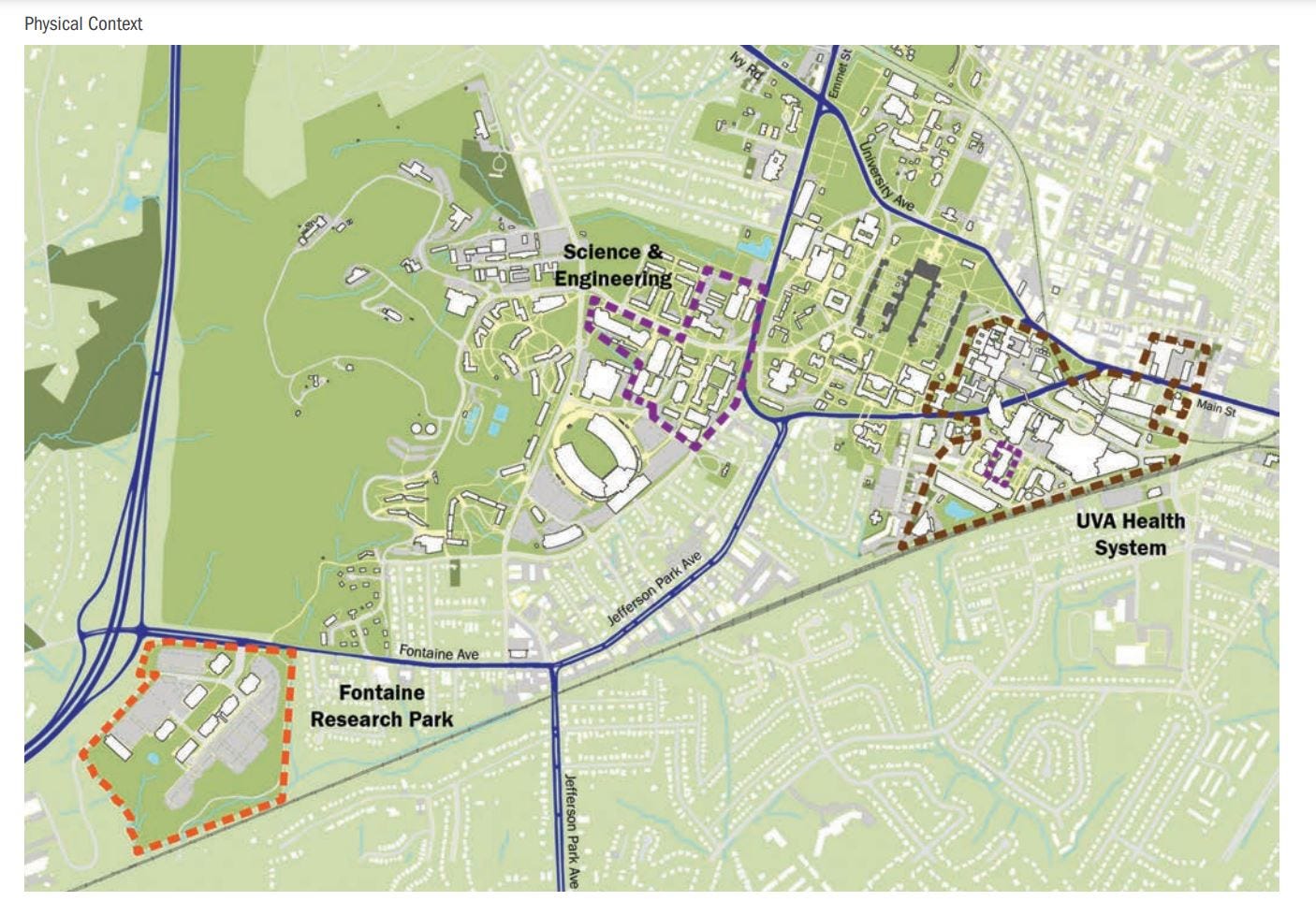
The University of Virginia adopted a master plan for the Fontaine Avenue Research Park in September 2018 as a “flexible road map for future development.” This plan ultimately envisions up to 1.4 million gross square feet of building space.
“We developed that over the span of about 25 years,” Missel said. “We started in the mid-90’s and we sold the Fontaine Research Park to the University back in I think it was 2018 so that is now considered Grounds, University Grounds.”
Other undeveloped properties include a 12 acre site to the west of Buckingham Circle which the UVA Foundation purchased from the UVA Physicians Group in 2016. The latter secured a rezoning for the Morey Creek property in July 2011 but never built the proposed office building. Missel described this as a “long-term hold for the University.”
Proffers associated with both the Fontaine Research Park and the Morey Creek involve making the area more pedestrian friendly. The Fontaine property serves as gameday parking for UVA football.
Another property that could have future buildings scrutinized is the 69-acre “Granger tract” which is undeveloped and currently zoned R-1. The land is currently owned by Stribling Holdings LLC.
“Access is a real bear because you do have to go under the railroad tracks, but that would not, I don’t believe any of the Fontaine viewsheds but probably would I-64 and potentially U.S. 29.
Another UVA-owned property in the area is the Piedmont Apartments complex run by University Housing for faculty.
“There has been discussion about whether or not what’s at Piedmont is still the highest and best of the property or if there is some other alternative use that might could be considered longer term and I can tell you that that’s been a question that has been around as long as I’ve been at the Foundation and that’s been 20 years.”
At the city line begins a Smart Scale funded streetscape project for which a public hearing is expected in “early 2021” according to the initiative’s website.
Coordination of land use planning in this area used to the purview of a public body called the Planning and Coordination Council. PACC consisted of officials from Albemarle, Charlottesville and the University of Virginia and meetings were open to the public. However, that ended in late 2019 when both the city and the county agreed to convert the body to one not subject to open meetings rules.
“PACC was formed out of the Three Party Agreement that was established by the UVA, the city and the county back in the 80’s and PACC was dissolved about a year and a half ago,” Missel said.
In its place is the Land Use, Environmental and Planning Committee, which is not open to the public. However, the meeting notes are posted on a public website. Missel is a member of LUEPC in his capacity at the UVA Foundation. And this newsletter is intended to shine as much light as I can on what’s happening.
In tomorrow’s newsletter, a look at the Ivy Road corridor also from the March 15, 2021 ARB meeting.





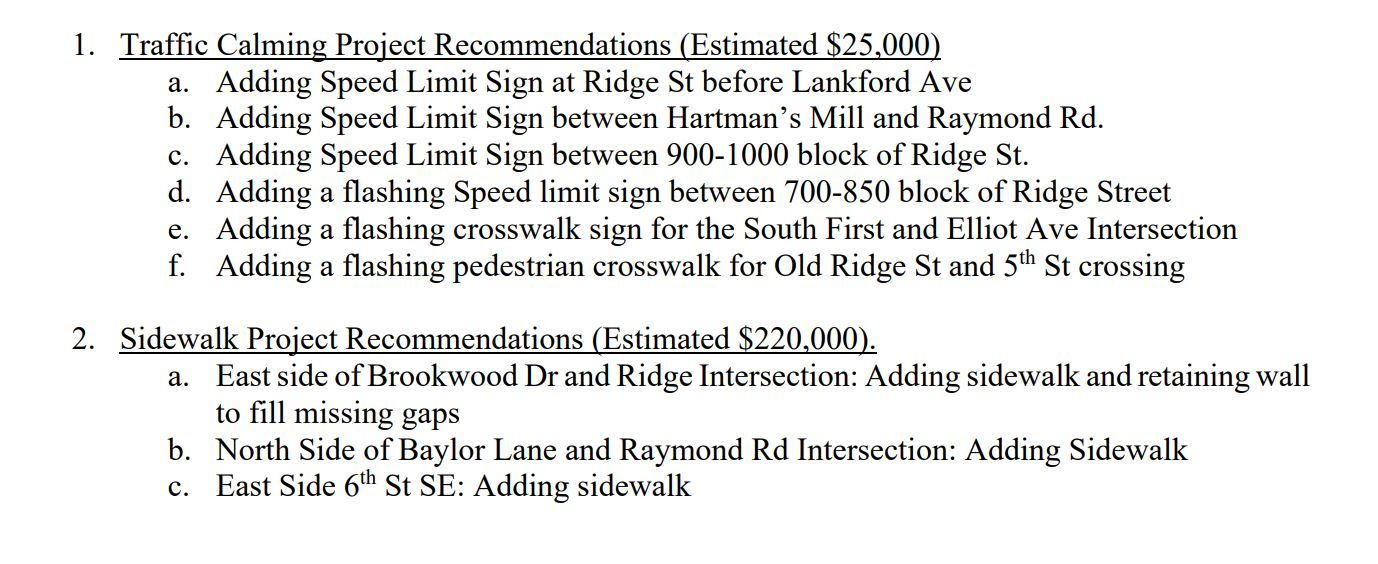
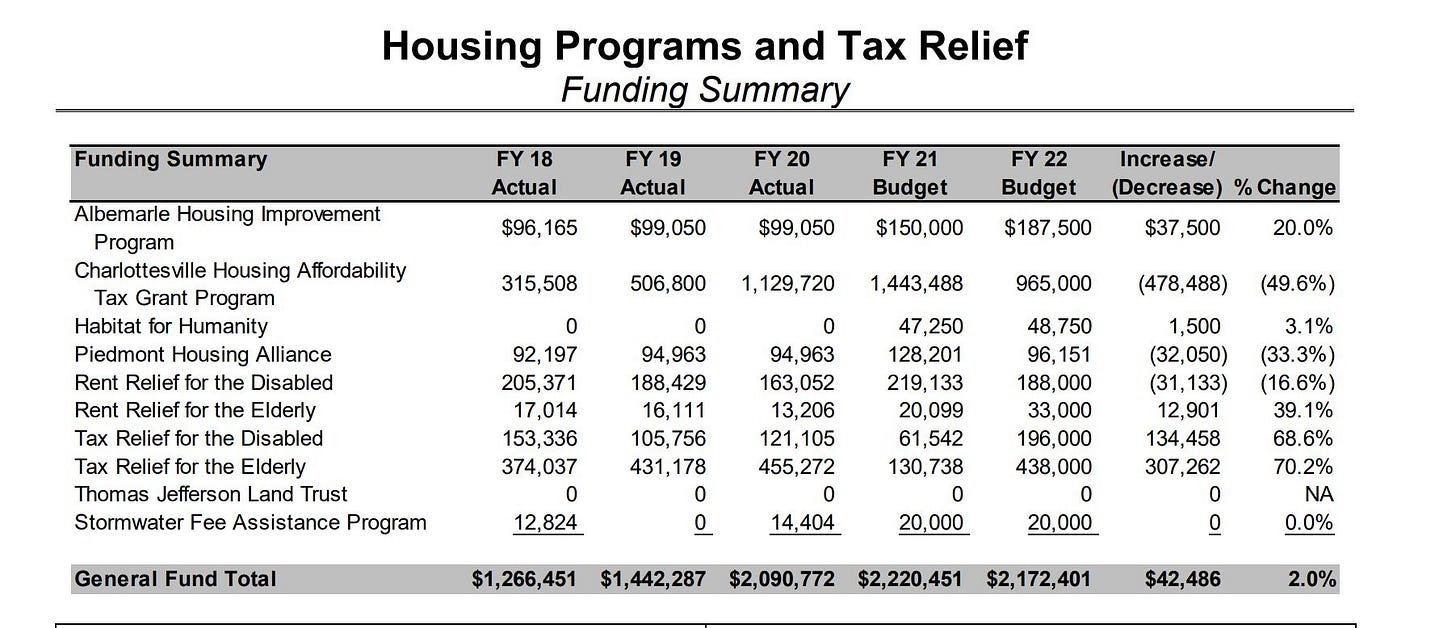
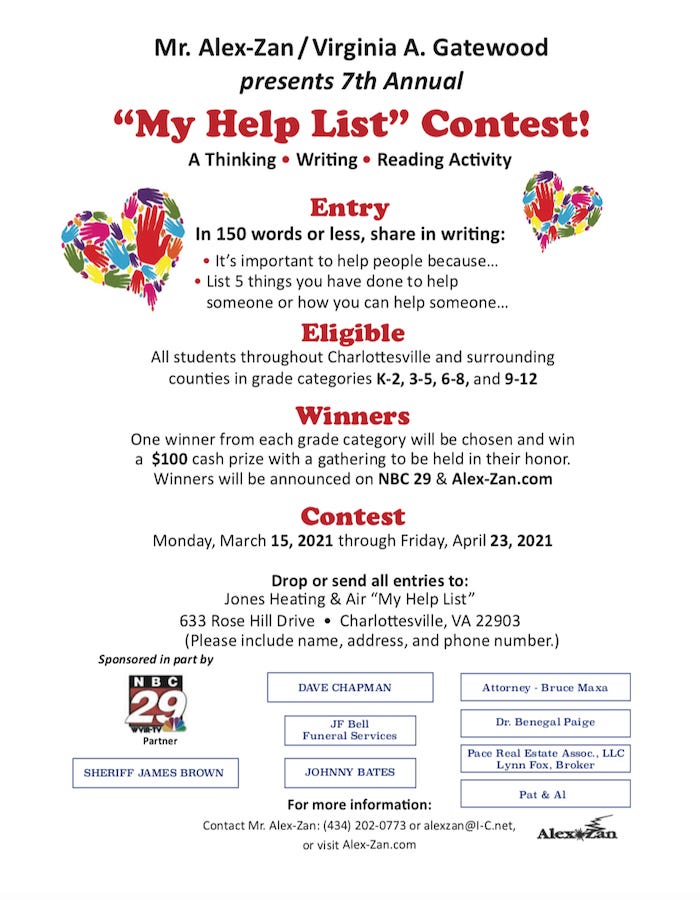
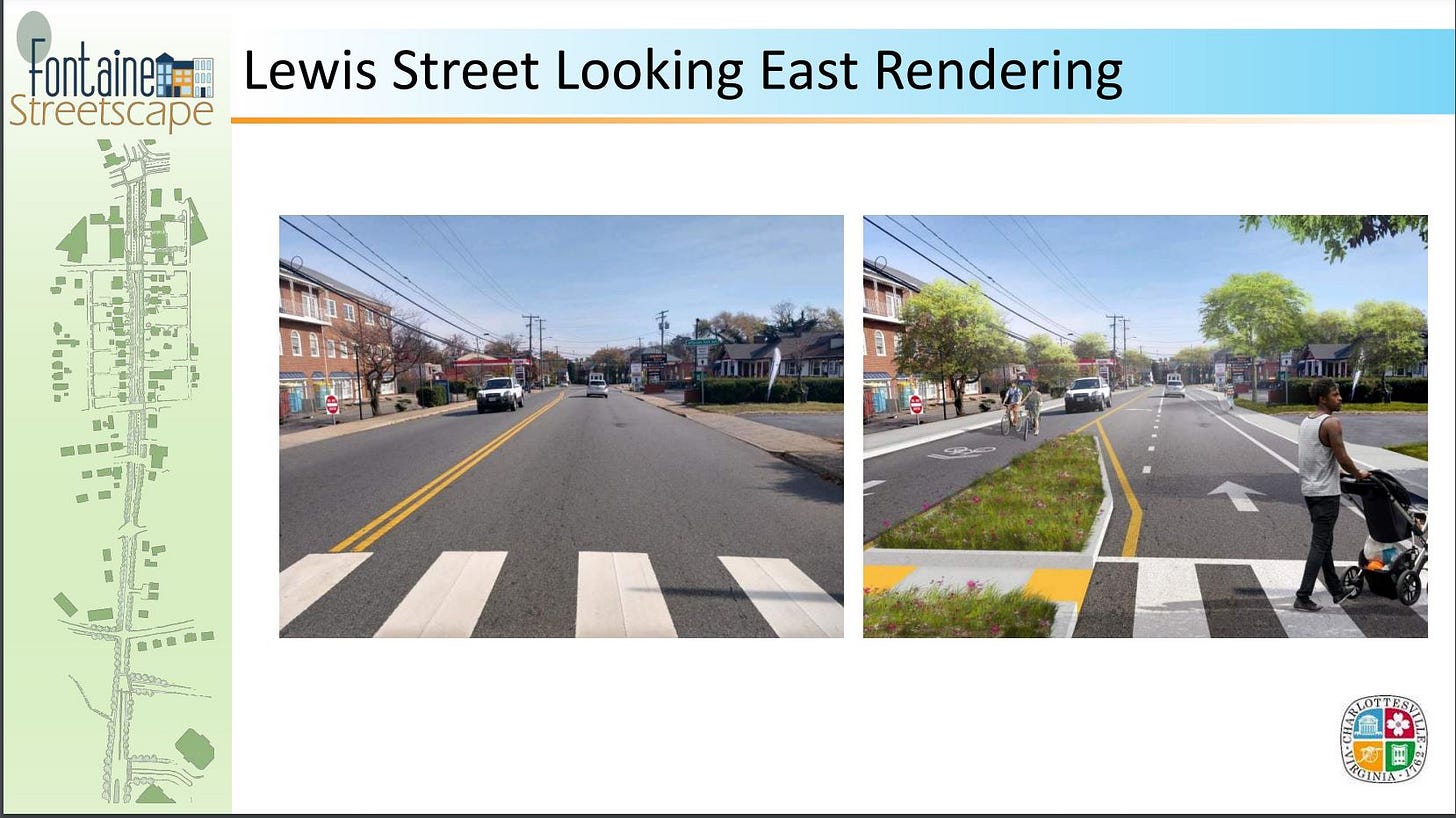









Share this post